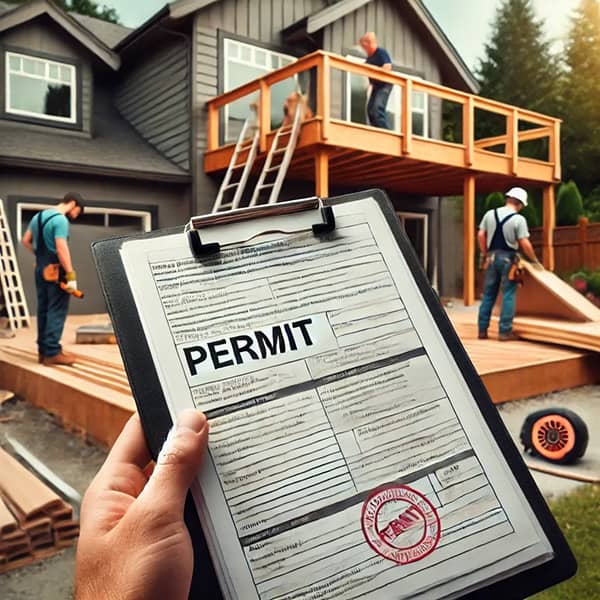Understanding Why Permits Are Essential for a Safe and Legal Deck Project
Building a deck is an exciting home improvement project, but before you start planning the layout and choosing materials, it’s important to understand the role of permits in deck construction. Permits ensure that your deck is built to code, meets safety standards, and complies with local regulations. Whether you’re building a new deck or making major modifications to an existing one, here’s what every homeowner needs to know about permits in deck building.

1. Why Are Permits Required for Decks?
Permits are in place to ensure that all construction projects, including decks, meet local building codes. These codes are designed to protect homeowners and the public by ensuring that decks are structurally sound and safe. Building a deck without a permit may seem tempting, but it can result in costly fines, delays, or even the need to tear down and rebuild the structure if it doesn’t meet code requirements.
2. When Is a Permit Required?
The requirements for permits vary by location, but generally, a permit is required if:
- The deck is attached to your home or is more than a certain height above the ground (often 30 inches).
- The deck has a roof or cover.
- The deck exceeds a certain square footage, typically over 200 square feet.
- Structural components such as railings, stairs, or footings are involved.
Always check with your local building department to understand the specific requirements in your area.
3. What Happens During the Permit Process?
The permit process typically begins with submitting a detailed plan of your deck design, including dimensions, materials, and structural details. Once your plan is approved, you’ll receive a permit that allows you to begin construction. After the deck is built, an inspector will visit your home to ensure the deck complies with building codes and meets safety standards.
- Design Plans: These must show how the deck will be built, including the size, type of materials, and how it connects to the house (if applicable).
- Inspections: After obtaining the permit, inspections will be scheduled during and after construction to ensure the deck is being built correctly.
4. Consequences of Skipping the Permit
If you skip the permit process, you could face several issues down the road:
- Fines and Penalties: Local authorities may impose fines for building without a permit, and you could be required to stop construction until a permit is obtained.
- Delays in Sale of Your Home: If you plan to sell your home, any unpermitted structures may need to be brought up to code, which could delay or even jeopardize the sale.
- Safety Risks: A deck built without meeting safety codes could collapse or fail, leading to potential injury or damage to your home.
5. DIY vs. Hiring a Professional
If you’re handling your deck construction as a DIY project, it’s your responsibility to ensure that all permits are in place. However, when you hire a professional deck builder, they will typically handle the permitting process for you. This can save time and ensure that everything is done correctly, giving you peace of mind throughout the project.
6. Cost of Permits
The cost of a permit varies depending on the size and scope of your deck project, as well as your location. Permit fees can range from $100 to several hundred dollars. While this may seem like an additional expense, it’s a small price to pay for the assurance that your deck is built safely and legally.
7. How to Apply for a Permit
To apply for a permit, you’ll need to visit your local building department or check their website for guidelines. Most departments offer downloadable forms and instructions for submitting your plans. Be prepared to provide:
- A detailed drawing of the deck, including dimensions and materials.
- Information about the deck’s structural elements (footings, joists, railings).
- Any information about how the deck will be anchored to your home.
Conclusion
Permits play a critical role in deck building, ensuring your project is safe, up to code, and compliant with local regulations. While it may add extra steps to your project, obtaining the proper permits protects you from legal issues, ensures your deck is structurally sound, and provides peace of mind for years to come. Whether you’re tackling the deck yourself or hiring a professional, always start with the right permits to ensure a smooth, safe, and legal project.

